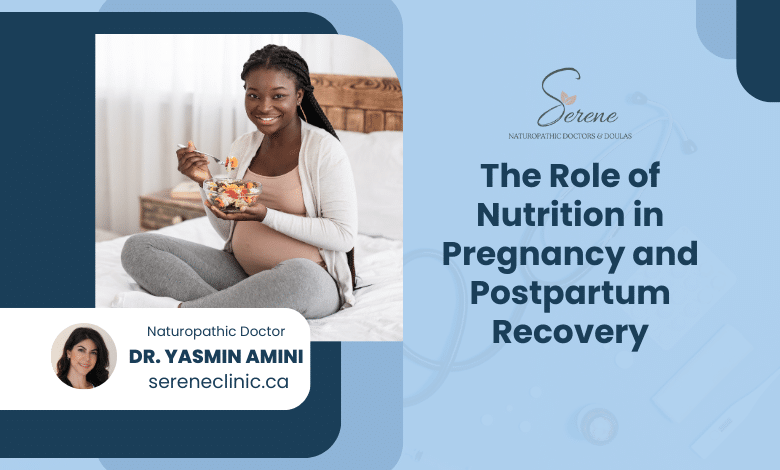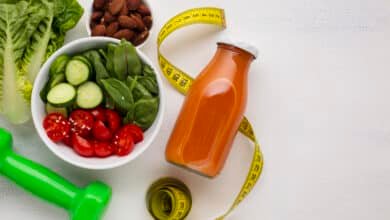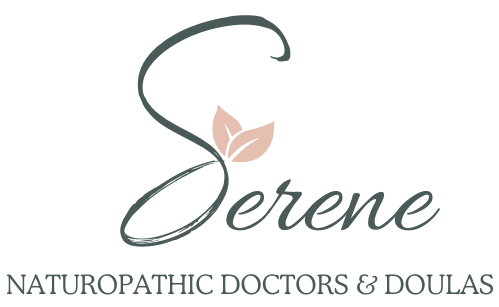The Role of Nutrition in Pregnancy and Postpartum Recovery

Discover natural, evidence-based support for postpartum mood shifts with a Naturopath doula in Toronto. Learn how Serene Clinic’s licensed Naturopathic doula Toronto in our Doula clinic can help you find emotional balance after birth.
Nutrition plays a critical role in the health of both the mother and baby during pregnancy, as well as in the recovery process after childbirth. The nutrients a woman consumes during pregnancy directly affect fetal development, maternal health, and the body’s ability to handle the demands of labor and delivery. After childbirth, proper nutrition supports recovery, promotes breastfeeding, and helps mothers regain their strength.
In this article, we will explore the essential role of nutrition in pregnancy and postpartum recovery, focusing on the key nutrients that are vital for both the mother and the baby at each stage of this transformative period.
Nutrition During Pregnancy
The first step in a healthy pregnancy is ensuring that the mother has a balanced, nutrient-dense diet. Pregnancy places increased demands on the body, requiring more energy, vitamins, minerals, and protein to support the developing fetus. The goal is to provide the necessary nutrients to promote healthy fetal development, reduce complications, and maintain maternal health.
Key Nutrients for a Healthy Pregnancy
-
Folic Acid (Folate)
Folic acid, also known as folate in its natural form, is crucial in early pregnancy for proper fetal neural tube development. A deficiency in folate can lead to neural tube defects, such as spina bifida.-
Sources: Leafy greens, fortified cereals, legumes, citrus fruits, and avocado.
-
-
Iron
Iron supports the production of hemoglobin, which is essential for carrying oxygen to the mother and fetus. Pregnancy increases blood volume, and low iron levels can lead to anemia, fatigue, and complications during labor.-
Sources: Red meat, poultry, lentils, beans, spinach, and iron-fortified cereals.
-
-
Calcium and Vitamin D
Calcium is essential for the development of the baby’s bones and teeth. Vitamin D works synergistically with calcium to support bone health, immune function, and muscle function. Adequate calcium levels during pregnancy also help prevent maternal bone loss.-
Sources: Dairy products, fortified plant-based milk, leafy greens, and fish like salmon. Vitamin D can also be absorbed through sun exposure.
-
-
Protein
Protein is vital for the growth of fetal tissues, including the brain, and for maintaining the health of maternal tissues, including the placenta and breast tissue.-
Sources: Lean meats, poultry, fish, eggs, legumes, tofu, nuts, and seeds.
-
-
Omega-3 Fatty Acids
Omega-3s, particularly DHA (docosahexaenoic acid), are crucial for the development of the baby’s brain and eyes. These fats also have anti-inflammatory properties that benefit the mother’s cardiovascular health.-
Sources: Fatty fish (like salmon, mackerel, sardines), chia seeds, walnuts, and flaxseeds.
-
-
Vitamin A
Vitamin A plays an essential role in the development of the baby’s eyes, skin, and immune system. However, excessive amounts of vitamin A can be harmful, so moderation is key.-
Sources: Carrots, sweet potatoes, spinach, and kale.
-
-
Iodine
Iodine supports proper thyroid function, which regulates metabolism and helps the fetus develop a healthy brain and nervous system.-
Sources: Iodized salt, dairy products, eggs, and seaweed.
-
-
Water
Staying hydrated during pregnancy is essential. Water helps with digestion, circulation, nutrient transport, and the formation of amniotic fluid. Proper hydration can also reduce the risk of constipation, a common issue during pregnancy.-
Sources: Water, herbal teas, and water-rich fruits and vegetables.
-
Additional Considerations:
-
Small, frequent meals: Many pregnant women experience nausea, especially in the first trimester. Eating smaller, more frequent meals can help maintain energy levels and reduce symptoms like morning sickness.
-
Limit processed foods: Minimize intake of highly processed foods, excessive sugars, and unhealthy fats, which can lead to gestational diabetes, excessive weight gain, and other complications.
Nutrition After Childbirth: Postpartum Recovery
The postpartum period is a time of significant physical, emotional, and hormonal changes. The body needs proper nutrition to recover from the strain of pregnancy and childbirth, promote healing, and support the new mother’s breastfeeding efforts. Nutrients are not only essential for the mother’s recovery but also play a key role in providing the necessary nourishment for breastfeeding.
Key Nutrients for Postpartum Recovery
-
Iron
After childbirth, iron is essential for replenishing blood stores and preventing postpartum anemia. Iron helps restore energy levels and supports the body’s ability to heal from the trauma of delivery.-
Sources: Red meat, poultry, beans, spinach, and fortified cereals.
-
-
Protein
Protein is important for tissue repair and healing after childbirth, as well as for maintaining muscle mass and strength. Adequate protein intake also supports breast milk production.-
Sources: Lean meats, eggs, dairy, legumes, tofu, and nuts.
-
-
Healthy Fats
Healthy fats, including omega-3 fatty acids, are crucial for recovery and breastfeeding. Omega-3s support brain health and have anti-inflammatory properties that can help with recovery from birth and the reduction of swelling.-
Sources: Fatty fish, flaxseeds, walnuts, and avocados.
-
-
Calcium and Vitamin D
Postpartum women need calcium for bone health and muscle function. Vitamin D works alongside calcium to support bone density and immune function, especially during the postpartum period when the body is recovering from the strain of pregnancy and childbirth.-
Sources: Dairy products, fortified plant-based milk, leafy greens, and sun exposure.
-
-
B Vitamins
B vitamins, particularly B12 and folate, are important for energy production, red blood cell formation, and proper nervous system function. They help the body recover from the physical stress of childbirth and support lactation.-
Sources: Eggs, leafy greens, whole grains, and legumes.
-
-
Water and Electrolytes
Hydration remains important after childbirth, especially for mothers who are breastfeeding. Breastfeeding requires additional water intake to produce milk, and dehydration can impact both energy levels and milk production. Consuming electrolyte-rich beverages, such as coconut water, can also help restore balance after labor and delivery.-
Sources: Water, coconut water, and soups.
-
-
Vitamin C
Vitamin C supports immune function, helps repair tissues, and aids in the absorption of iron. It also helps reduce the inflammation that can arise during the healing process after childbirth.-
Sources: Citrus fruits, bell peppers, strawberries, and broccoli.
-
-
Magnesium
Magnesium supports muscle relaxation, reduces cramping, and promotes sleep, all of which can be beneficial during the postpartum period when many women experience sleep disruptions and muscle tension.-
Sources: Leafy greens, nuts, seeds, and whole grains.
-
Additional Tips for Postpartum Nutrition
-
Eating for Energy: New mothers often experience fatigue during the postpartum period, especially if they are breastfeeding. A nutrient-dense, balanced diet can help combat fatigue and support energy levels throughout the day.
-
Breastfeeding Support: Consuming adequate calories and fluids is crucial for mothers who are breastfeeding. Breastfeeding burns extra calories, and proper nutrition helps ensure an abundant milk supply.
-
Recovery-Friendly Foods: Nutrient-dense foods, like bone broth, lean proteins, and fiber-rich fruits and vegetables, help speed up postpartum recovery by providing the building blocks for healing and supporting digestive health.
-
Avoiding Empty Calories: While it may be tempting to reach for processed snacks or comfort food, it’s important to choose nutrient-dense foods that will aid in recovery and provide long-lasting energy.
Conclusion
Nutrition plays an integral role in both the pregnancy and postpartum periods. During pregnancy, the body needs additional nutrients to support fetal development, energy levels, and overall maternal health. After childbirth, the focus shifts to recovery, healing, and providing nourishment for breastfeeding. By prioritizing nutrient-dense foods, staying hydrated, and addressing any nutrient deficiencies, mothers can support both their own health and the health of their newborns.
A well-balanced, whole foods-based diet—rich in protein, healthy fats, vitamins, minerals, and hydration—can help mothers feel their best during this transformative period. It is important to work with a healthcare provider or nutritionist to tailor a diet that meets your specific needs, whether you are pregnant or postpartum. With the right nutrition, new mothers can thrive and recover with strength and vitality.
Serene Clinic Naturopathic Medicine Book Your Free Consultation Today
Connect with a Naturopathic Doctor and Doula near you, whether you are in Toronto or anywhere in Ontario.
Serene Clinic Naturopathic Doctors Book your complimentary meet and greet with an Ontario licensed Naturopathic Doctor and Doula:
https://sereneclinic.janeapp.com
This article is for informational and educational purposes only and is not intended as a substitute for medical advice, diagnosis, or treatment. Always seek the advice of your physician or other qualified health care provider with any questions you may have regarding a medical condition.
No. A Naturopathic Doctor ensures all remedies are safe and complement your current prescriptions.
Yes! Our Naturopath doula visits often qualify under extended health plans.
No. Baby blues are common and short-lived. PPD requires targeted support.
As early as day 1. We recommend booking at least 1 prenatal visit in advance.
Absolutely. All birthing experiences are welcome at our Toronto doula center.
Yes! We work collaboratively with your medical team for integrative, whole-person care.






